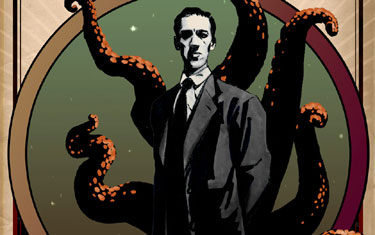Now, if you don’t know who Cthulhu is, keep enjoying your safe, Euclidean environment and relish your sanity.
Otherwise, open your Necronomicon to page 666, and contemplate the following poem:
Below the thunders of the upper deep,
Far, far beneath in the abysmal sea,
His ancient, dreamless, uninvaded sleep
[He] sleepeth: faintest sunlights flee
About his shadowy sides; above him swell
Huge sponges of millennial growth and height;
And far away into the sickly light,
From many a wondrous grot and secret cell
Unnumbered and enormous polypi
Winnow with giant arms the slumbering green.
There hath he lain for ages, and will lie
Battening upon huge sea worms in his sleep,
Until the latter fire shall heat the deep;
Then once by man and angels to be seen,
In roaring he shall rise and on the surface die.
This, of course, is obviously the work of H.P. Lovecraft, whose Cthulhu mythos remains resplendently vibrant to this day, having oozed its tentacles into all manner of pop culture. Why, Cthulhu’s even found his way into politics, which seems apropos:

There’s only one problem here:
The poem above isn’t by Lovercraft, and it isn’t about Cthulhu…
*
Enter Jorge Luis Borges, and his Book of Imaginary Beings.

As its name implies, this book is an A-Z compendium of fictitious beasties, all with associated literary allusions. It’s not a book you read cover to cover.
Instead, it’s the type of book that demands to be opened at random.
Which is how I stumbled upon the poem that starts this post.
A poem not written by H.P. Lovecraft about Cthulhu…
Instead, a poem printed a good thirty years before Howard Phillip was born.
A poem about the Kraken, composed by Alfred Lord Tennyson, Poet Laureate of Great Britain and Ireland in the year 1830.
Lovecraft wouldn’t publish Call of Cthulu until 1926, nearly a century later.
*
So, was Lovecraft “inspired” by Tennyson? At least one scholar, Robert M. Price, argues as much, though other texts certainly shaped the secluded Rhode Islander, including the works of Irish-Anglo fantasy writer Lord Dunsany, whose world building, as seen in The Gods of Pegāna [public domain], was cosmological in its scope:
“In The Gods of Pegāna I tried to account for the ocean and the moon. I don’t know whether anyone else has ever tried that before.” To quote American fantasy-horror illustrator Gahan Wilson, Pegāna is “a wonderfully sustained exercise in totally ironic fantasy which may never be beaten. Speaking in a highly original mix of King James Bible English, Yeatsian syntax, and Scheherazadian imagery, [Dunsany] introduces us to a wonderfully sinister Valhalla populated with mad, spectacularly cruel and wonderfully silly gods … whose only genuine amusement appears to derive from the inventive damage they inflict upon their misbegotten worshippers [sic]”
Mad, spectacularly cruel gods who find amusement in the inventive damage they inflict on their misbegotten worshipers? That alone might be enough to bring a smile to the Great Old Ones themselves.
Or to quote Lovecraft, “Ph’nglui mglw’nafh Cthulhu R’lyeh wgah’nagl fhtagn” – “In his house at R’lyeh, dead Cthulhu waits dreaming.”
Dead, dreaming…
and smiling.


3 thoughts on “The Devil and the Deep Blue Sea: Cthulhu Origins”